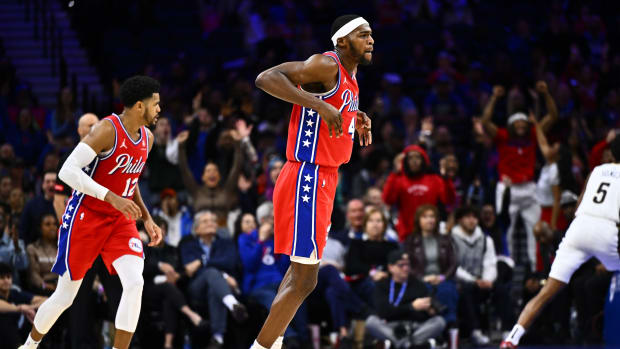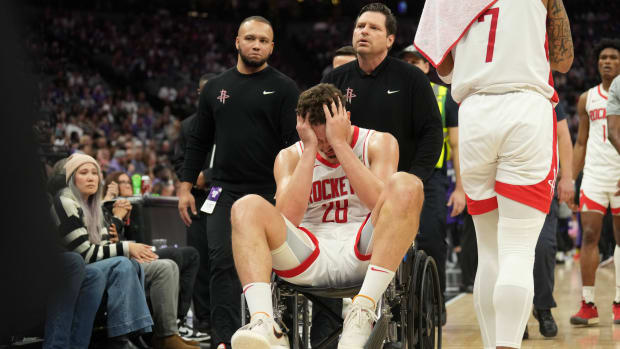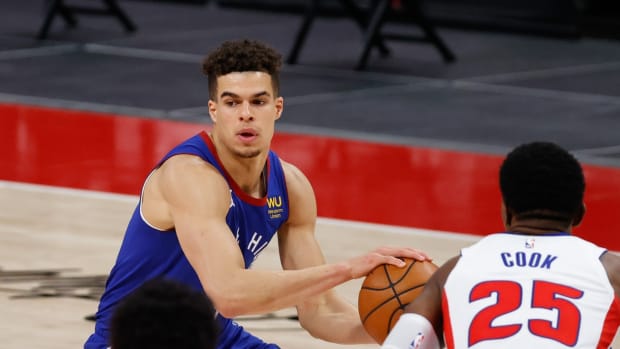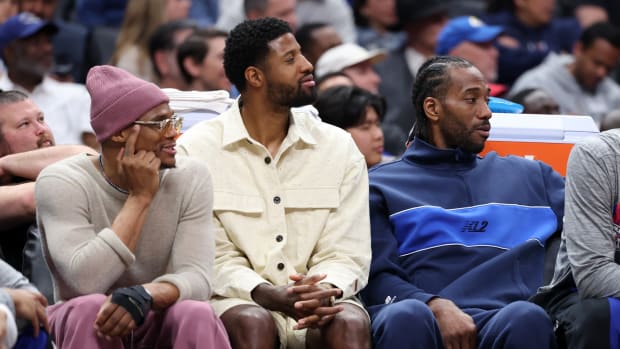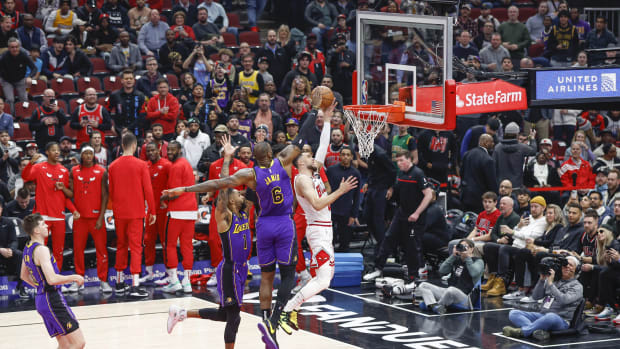NBA matchmaker: Finding the perfect teams for 10 free agents
Your teams. Your favorite writers. Wherever you want them. Personalize SI with our new App. Install on iOS or Android.
So much of the reporting leading up to the NBA’s free agent bonanza expresses one-sided interest. Team X wants to meet with Kevin Durant. Mike Conley is open to signing with Team Y. As a fun exercise, let’s try to guide both to a sensible middle.
Beginning at midnight on July 1, teams and players can come to agreements in principle on new contracts—some richer than the league has ever seen thanks to an inflated salary cap. For today, we aim not to predict where a player might actually end up, but which circumstances seem to make the most sense for all parties involved.
Kevin Durant: Oklahoma City Thunder
Seeing great players switch teams charges basketball fans with a sense novelty and discovery. Consider the possibility of Durant joining the Warriors. Even during the season, the mere mention of the idea incited a spirited debate over Durant’s optimal basketball environment. Would Durant be content moving without the ball next to Stephen Curry or does he live to cook? The only way to know for sure would be to transplant KD into an entirely different kind of basketball ecosystem, not only separate from Russell Westbrook (whom Durant has played alongside for eight years) but the entire Thunder way of life.
• Kevin Durant's free agency: Why anything is possible this summer
Everything about that scenario radiates real basketball intrigue, not to mention the rivalry politics of Durant leaving one West contender—and demolishing it in the process—to join another. Yet in the wake of the Thunder’s splendid (if ultimately failed) postseason run, Durant’s return simply makes too much sense to properly indulge the daydream. Oklahoma City has done right by Durant. Westbrook has developed wonderfully alongside him. Head coach Billy Donovan mounted an impressive first NBA season full of gradual refinements. Sam Presti and the Thunder front office have maintained a constant proactivity to keep OKC competitive and refreshed at every step, through difficult decisions at all. Durant lives in a city he can call home, works for an organization that has an endearing, unified ethos, and has a chance to win a title next season. Whatever part of Durant might want to experience something different is likely to be quieted by the Thunder’s many virtues.
A one-year deal with a player option attached would give Durant a season to run it back with a similar team that has, with the trading of Serge Ibaka for Victor Oladipo, already taken steps to evolve. Doing so would position Durant to make dramatically more money on a max deal under an even higher salary cap and in a different earning bracket. It would allow him and Westbrook to chart a path together, should they chose to, or agree to part ways. Not least of all: it would give Durant at least once more chance to attempt the same goal he has dedicated the last nine years of his life to.
• Open Floor Podcast: Kevin Durant sweepstakes and more FA chatter
Nicolas Batum: Golden State Warriors
When the Warriors kick the ball to Harrison Barnes in the corner, his best options are often to shoot or defer. Any other course can end in a mess; Barnes doesn’t have the shake in his game necessary to lose opponents off the dribble nor the complete view of the floor to play as a facilitator. And so his drives often end as awkward turnarounds in traffic or desperate fadeaways, none very promising. Whatever ball movement Golden State had trailed off in a wilt.
Give Batum those same opportunities and the offense hums. He would begin the scenario as a comparable three–point shooter, particularly when accounting for the quality of his shots over the course of his career. Yet if the defense forced him off the line, Batum could function as a variant of Andre Iguodala—more willing to score but fully capable of stringing the offense into its next stage. Charlotte’s offense came alive last season when Batum flanked Kemba Walker, an off-the-dribble threat, working in space. Golden State stretches both of those elements to geometric extremes to create even wider driving lanes and more consistent playmaking opportunities. The difference in age (Batum will be 28 in December while Barnes just turned 24), post defense, and potential salary (Batum is eligible for a higher max given his experience level, requiring that the Warriors unload a player like Andrew Bogut to sign him) will give Golden State plenty to think about. So, too, will the possibility of the market making Barnes a max player—calling into question whether the Warriors can do better with such a significant salary.
Al Horford: Detroit Pistons
Detroit quietly cleared $6.5 million in salary this week by trading Jodie Meeks, who missed almost the entirely of last season with a foot injury, to Orlando. That—along with Andre Drummond’s preposterously low cap hold—further enables the Pistons to explore their options in free agency. Horford is among their targets, according to ESPN.com’s Zach Lowe, and makes perfect sense. Andre Drummond doesn’t just need a floor-spacing big alongside him. He needs a playmaker; Reggie Jackson is single-handedly responsible for so much of Detroit’s ball-handling and shot creation that it makes the offense vulnerable. A few intermediaries would go a long way.
Horford, for example, could man the high post and pick out cutters with passes, catch on the move and find open teammates, or act as an outlet on the weak side. So long as wings like Kentavious Caldwell-Pope, Marcus Morris, and Stanley Johnson are the rotation norm in Detroit, facilitation would have to be found elsewhere. Horford could be stellar in that capacity while also working as the team’s second-unit center and helping to coach up Drummond on the finer points of positional defense. The fit is rather tidy from the Pistons’ perspective. At issue is whether Detroit’s roster (and the chance to finally play power forward on a more regular basis) interests Horford enough to leave a solid situation in Atlanta and the financial particulars of the Pistons clearing a bit more room for him to land.
Hassan Whiteside: Miami Heat
Thus far, only one basketball organization in the known world has allowed Whiteside to play to his ability without driving everyone around him mad. Remove him from that contained environment at your own risk. I have no doubt that Whiteside’s skillset could travel well to many other organizations with interior needs. It’s their capacity to deal with the rest of Whiteside’s infamous profile that seems somewhat concerning—particularly once Whiteside inks a huge deal and satisfies the biggest motivator of all. A pre-contract Whiteside scared opponents around the rim and put up monster numbers, but frustrated teammates and coaches in the process. A contract year, too, seemed only to encourage Whiteside to chase stats (leaving his feet too often for the sake of blocks, failing to box out and secure contested rebounds while making an effort for uncontested ones) at the expense of the little things that genuinely help teams win. What kind of player might Whiteside be once he’s no longer financially encouraged to be on his best behavior?
That question alone is so daunting that it would be best to remove all other variables possible. There are financial difficulties in Miami bringing back Whiteside at what he would deem an acceptable price, not to mention a potential optics problem in paying Whiteside big while losing or underpaying Dwyane Wade. Still they should try to make it work. Whiteside, imperfect as he is, provided enough to Miami to make a future investment worthwhile. This franchise could soon see the end of Wade’s career and, in a particularly sad scenario, the end of Chris Bosh’s. Whiteside isn’t reliable enough to follow them as a pillar of the organization but could hold the Heat over until they find a star who is.
• Who wants to pay Hassan Whiteside? Examining his potential suitors
Dwight Howard: Charlotte Hornets
It’s getting more and more difficult to find Howard a comfortable free agent home, which is precisely why some executives reportedly predict a tepid market for his services. Howard requires the catering of a high-maintenance superstar but no longer performs like one; the post touches he demands return little, he’s neither much of a leader nor an easy complement to other stars, and even Howard’s best contributions (defense, rebounding) can waver with his injuries and interest level. Some teams will understandably spare themselves the trouble.
Charlotte could be a different story. The shape of the Hornets’ roster is changing with the joint incidence of so many players’ free agency. Batum, Marvin Williams, Al Jefferson, Courtney Lee, and Jeremy Lin are all free to cash in with the biggest deals they can find. The trick for Charlotte lies in maintaining a competitive roster while keeping some but not all of those contributors—an exercise that cuts to the heart of what the Hornets value and where they believe their success comes from.
Howard’s addition would represent an evolutionary step consistent with Charlotte’s playing ideals. Much of what Cody Zeller can do Howard can do better, and much of what Jefferson did poorly Howard has historically done well. There should also be room for the Hornets to make a run at Howard while still offering Williams, a smart frontcourt pairing, a competitive wage. Doing so would likely cost Charlotte a chance at returning Batum. It’s a hard call, though the Hornets as they were are about to become wildly expensive for one of the East’s middling teams.
Howard, for his part, should be looking for spacing-driven teams in need of a defensive big. Charlotte qualifies. Head coach Steve Clifford, who coached Howard as an assistant in Orlando, is the closest thing the league has to a Stan Van Gundy surrogate. There could be room in his offense to indulge Howard’s post-up fancy without veering into chronic inefficiency and a familiarity to his defense that could help Howard to center himself. There’s no turning back the clock, but a team like the Hornets might at least help Howard tap back into what made him such a force in the first place.
Kent Bazemore: Memphis Grizzlies
Stable wing play has eluded Memphis for years, whether due to one–way players who create lineup imbalances or swings for late-career shooters who haven’t quite held up as intended. Bazemore gives the Grizzlies an opportunity to remedy the situation with functional all-around play. On his own, Bazemore isn’t quite accurate enough from the perimeter to be a top three-point option nor savvy enough defensively to be a first-rate defender. What he brings is a general utility underlined by resourcefulness and energy. Success as a role player is often a function of limiting liabilities. Bazemore, through his patient development, has done that in a way that would allow Memphis to make the most of his explosive streaks in transition and practical skill set.
Marvin Williams: Indiana Pacers
If Indiana wants to add juice to its offense through tempo, it should start by adding versatile wings actually open to the idea of playing power forward. Williams did just that for the Hornets last season and might be the most balanced stretch big on the market for sub-max spenders. Allow him to take the matchups that Paul George, whether by prioritization or preference, would not. What Solomon Hill was for stretches in the playoffs, Williams could be full time: a long, willing defender with proven long-range shooting ability. It’s a shorter-term play given that Williams is already 30, though Indiana has operated with the intent to field competitive teams throughout a reorganization of its roster and coaching staff. Williams would make the Pacers better in exactly the way they seem to want.
• NBA free agency: Backup options for teams chasing after superstars
Jeremy Lin: New Orleans Pelicans
New Orleans needs point guard insurance, if only to ensure that players of the caliber of Norris Cole and Toney Douglas aren’t put in a position to average more than 20 minutes a game. Jrue Holiday is a pre-existing condition; stress and leg injuries have limited the Pelicans’ lead guard to just 57% of the team's total games the last three years, forcing the team to monitor his minutes closely. An optimal addition, then, would be a guard capable of working both alongside Holiday and in his place. Lin fits the bill. His experience playing alongside Kemba Walker last season provides a nice template for how Lin’s counter-driving game could help a team like New Orleans. Other needs (shooting, first and foremost) will probably come first, but the Pelicans need to do all they can to better prepare for potential injuries and alleviate the on-court stresses on Anthony Davis. Lin can absorb that responsibility to greater effect than most any backup available.
• Gallery: Kevin Durant and who? Top 50 NBA free agents of 2016
Top NBA Free Agents of 2016
1. Kevin Durant
2. LeBron James (player option)
3. Andre Drummond (restricted)
4. Al Horford
5. Mike Conley
6. Hassan Whiteside
7. Dwight Howard
8. Bradley Beal (restricted)
9. Nicolas Batum
10. Dwyane Wade
11. DeMar DeRozan
12. Tim Duncan (player option)
13. Dirk Nowitzki
14. Chandler Parsons
15. Pau Gasol
16. Bismack Biyombo
17. Ian Mahinmi
18. Festus Ezeli (restricted)
19. Ryan Anderson
20. Marvin Williams
21. Al Jefferson
22. Harrison Barnes (restricted)
23. Kent Bazemore
24. Evan Fournier (restricted)
25. J.R. Smith
26. Courtney Lee
27. Jordan Clarkson (restricted)
28. Luol Deng
29. Evan Turner
30. Jeremy Lin
E’Twaun Moore: Atlanta Hawks
Another year, another need for the Hawks to make good on their value propositions. The same developmental pipeline that improved upon the games of Bazemore and DeMarre Carroll could next set its sights on Moore—an all-around competent wing who came into his own for the Bulls last season. The smart, conservative feel of Moore’s game speaks to the preferences of Hawks head coach and general manager Mike Budenholzer. One could see him balancing the wilder streaks in Dennis Schroder’s game, slashing to complement Kyle Korver’s shooting, and doing enough off the dribble to lend Atlanta a touch of dynamism in that spot should Bazemore decide to move elsewhere.
Maurice Harkless: New York Knicks
Given that New York is short on both athleticism and wing players of any kind, Harkless seems a practical choice. The jumper is a real concern; Harkless is shaky (and reluctant) enough from the perimeter that teams take notice and play him accordingly, which can create problems elsewhere on the floor. Yet considering that a two-way wing with a jumper would cost dramatically more than Harkless might, the financial tradeoff seems worthwhile to help the Knicks improve elsewhere. Add a defender and cutter who can swing between three positions and run the floor to help balance out the shot creation and defense the team already has. Worry about scheming around Harkless’s jumper later, when things like playoff scrutiny are actually a relevant problem.































































